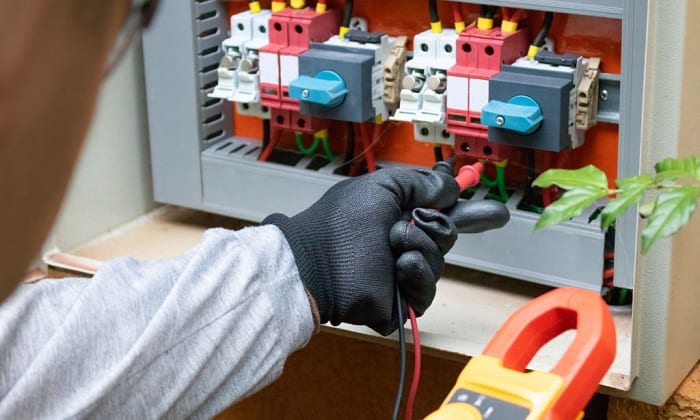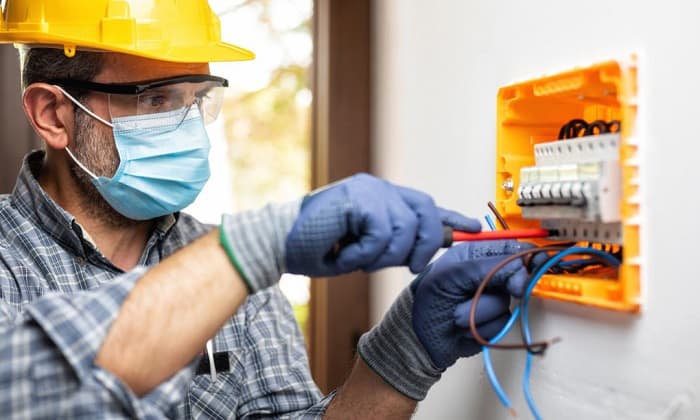Caution is always required when we deal with tasks involving electricity. Whether we operate tools and machines at the working site or repair the electric system at home, it’s essential to wear suitable protection throughout the task.
Incidents happen when we are not aware of the dangers around us while working. So, there are many issues we should know before any task, and among them is the question, “Will rubber gloves prevent electric shock?”
The answer is yes if the rubber gloves are designed for electrical use. But for usual rubber gloves, this function is not reliable or even non-existent.
Table of Contents
Do Rubber Gloves Prevent Electric Shock
Yes, if the rubber gloves are produced and tested to meet the protective requirements against electrical shocks.
When purchasing rubber pairs, you can check their testing that qualifies the maximum voltage that their insulation can handle. For instance, the figure will look something like this: 17,000V AC / 25,500V. We can rely on this number to check with our current working range to ensure we have a pair that suffices.
The electrical-insulating rubber gloves can also come with a specific class specified by the NFPA (National Fire Protection Association) or ASTM (American Society for Testing & Materials). We can see the class type to notice the voltage rating offered by the pair to meet our work site’s requirements.
Furthermore, rubber gloves to prevent electric shock can come with high-quality leather protectors. The added component ensures no cutting or tearing for the insulation rubber layer.
For your information, these work gloves will be tagged as products for utility workers, construction workers, electricians, linemen, and more. And that’s the most apparent clue about their function.
Meanwhile, it’s a no when rubber gloves are simply made of soft rubber with no electrical insulation. A latex or rubber pair designed for cleaning the dishes or gardening cannot keep you safe against electrical hazards.
Will Latex Gloves Protect from Electric Shock
Latex gloves can keep us safe from electric shock only when made from 100% pure latex. They must be formulated to protect against electrical hazards, which are classified as tools for electrical applications.
In truth, latex gloves come with high-dielectric attributes, and are thus popular among tools for electricians and other workers that deal with electricity. They are compatible with low to ultra-high voltage tasks, which we can read on their description when purchasing the product.
One more thing, as we are sure latex gloves are manufactured for working with electricity at the right voltages, we must check if they have any pin holes or tears. No matter how incredible the protective function of a latex pair is, if it has holes, scratches, or tear marks, it can allow electricity to pass through and hurt us badly.
Can Latex Act as a Conductor
Rubber and latex are not substances that allow electricity or heat to go through them. In other words, they are non-conductive. However, we should not rely on thin latex gloves to keep us safe against 35 000 volts.
How Long Can Rubber Electrical Gloves Work
We probably need a new pair of rubber electrical work gloves after 6-month use due to various issues like scratches, punctures, abrasions, etc. Therefore, make sure you inspect the gloves often and replace them if necessary.
What Types of Gloves Can Prevent Electric Shock
1. Rubber-insulated gloves
They can protect users against a broad range of voltages, depending on their class rating. These pairs’ best attributes are incredible flexibility, dexterity, and good grip.
2. Leather protector gloves
These products are often made of cowhide, goat-grain leather, premium-grade brown goatskin, or goatskin leather with Kevlar lining, etc. They can also provide safety when working with low and high voltage. Besides, they are comfortable and durable, offering good elasticity for intricate work.
3. Nitrile work gloves
Premium nitrile material is also used in making electric-resistant gloves. They often come with a coating for extra protection. Their best characteristics are a strong grip and excellent dexterity.
4. Various materials
The combination of leather, nylon, spandex, and neoprene surely makes a fine lineman work glove. It allows excellent durability and comfort with minimal compromise on dexterity.
Conclusion
So, will rubber gloves prevent electric shock? We hope you already have a satisfying answer to such an important matter before starting work. When performing tasks involving electrical hazards, we should be equipped with proper protective tools and knowledge to minimize the risks of accidents.
Make sure you check out all information required for your work to keep yourself safe. Regarding any questions, do not hesitate to reach out to us via our contact page. Also, feel free to share the article if you find it helpful. Thank you!

This is Edward Manning, the editor in chief of Construction Informer. Quite a bit of my time is spent researching the market and interviewing experts in the field so that I can give you reliable information.




